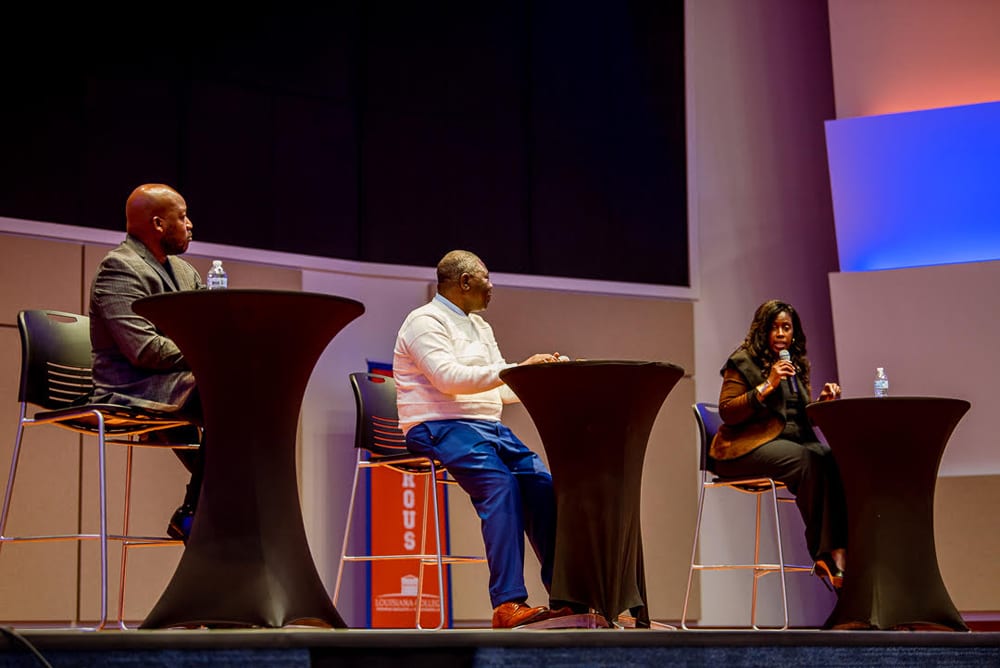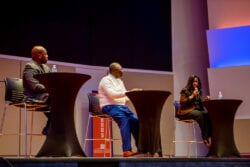by Alena Noakes, Wildcats Media
“God’s plan is to unite us as one, and you have the opportunity to be a part of that process.”
That was the message of Gregory Bevels, a local physician and pastor, who was one of the guest speakers at Louisiana College’s (LC) 5th annual Values and Ethics Conference in November. The two-session conference featured speakers from various backgrounds all addressing the same critical issue in today’s culture, racism.
The first session featured Bevels, Louisiana Senator Katrina Jackson, author of the Louisiana Right to Life amendment and equal rights proponent in the legislature, and Joshua Joy Dara, Sr., dean of the department of human behavior and associate vice president for student engagement and enrichment at LC. LC also welcomed keynote speaker, Chris Singleton, former pro-athlete and inspirational speaker, via a Skype call to join in the discussion.
In a time of tense racial division in America, LC sought to provide Gospel-centered perspectives on how to view and respond to these trials. The core point made by each speaker is best summed up in one word, unity.
“I think this mission of unity that we have […] that’s Jesus’ mission,” said Singleton. “And I think if we lead people, no matter where they’re from or what they look like […] if we lead them to the Lord, I think that we’re doing our job as believers.”
Bevels emphasized God’s plan for unity through the design of the human race, referencing Revelation 7 and 9 where many nations are unified together, showcasing God’s intentional diversity in Creation.
“This same diversity that’s in this room today is going to be retained in eternity,” Bevels said. “It will be this way in heaven. So, why is it that we can’t engage in that type of fellowship now?”
Jackson considered the division evidenced today, noting the things which have led to so much strife.
“I think that the enemy really perpetuates race as a division because it is the one thing we see all the time,” Jackson said. She stressed the importance of self-evaluation in overcoming this, addressing this aspect first as believers. Self-evaluation helps believers to determine whether there are certain prejudices they hold which prevent them from loving their neighbor as they love themselves, the second commandment given in Matthew 22:39.
Each speaker also prioritized the aspect of forgiveness as a means to dealing with racism today.
“I think that it is so important as believers we realize since we are forgiven, then we should then forgive,” Singleton said.
“Mistreatment of any kind will happen, some in ways big, some in ways small,” explained Bevels. “But you have to forgive, and you have to recognize once again that you’re not perfect … I’m not perfect, neither are they.”
However, action does not stop at forgiveness, rather it is merely the first step. In order to overcome racism today, people must be willing to act in more than just words.
Singleton pointed out that sharing experiences, being willing to be taught and to teach others, checking your own heart, teaching your family to love, and simply loving your neighbor must accompany forgiveness.
Jackson spoke on how believers should approach conversations about race, acknowledging these conversations do not need to be awkward or negative because they are necessary. “Race is not a difficult issue, it’s just something we make difficult because we are not willing to face it in our own lives,” said Jackson. “So, we can’t face it in other people’s lives until we face it in our own lives.”
Additionally, these discussions need to be had in churches today. “Our churches have begun to stray away from teaching the truth of Scripture in those difficult areas, and it’s really been a thorn in the side of our witness because we’re shying away from stuff … we have to continue to teach the truth of Scripture … no holds barred,” Bevels said.
Both Bevels and Jackson indicated this practice includes being led by the Holy Spirit, being intentional in who you gather with and doing more to integrate different races and people of various backgrounds into each other’s worship experiences.
Jackson cited the way to true reform in America, to any appropriate response to racial injustice today, starts within the Church.
“Just laws start in the hearts of the people of God. Just actions start in the heart of the people of God,” she said. “That means just resolution comes through the heart of the people of God.





























